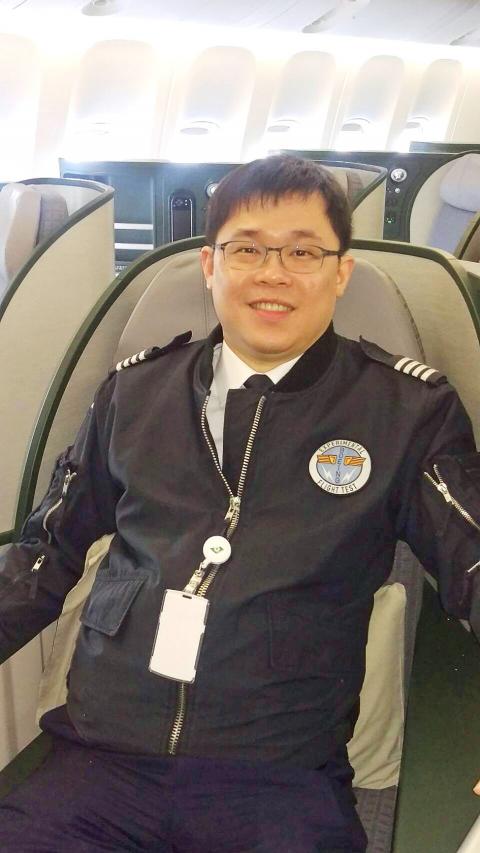Former EVA Air Corp (長榮航空) chairman Chang Kuo-wei (張國煒) yesterday completed his exit from the company as he prepares to reenter the industry with his own carrier, StarLux Airlines (星宇航空).
Although Chang remains a major shareholder in the company with a 11.45 percent stake, after its board of directors election yesterday he has made a clean exit from EVA Air.
With his stake, Chang could have appointed up to two representatives on EVA Air’s board, market commentators have said.

Photo: Wang Yi-hong, Taipei Times
Meanwhile, leadership of the company has been fully secured by Chang Kuo-hua (張國華), Chang Kuo-wei’s elder brother, who has prevailed in the succession battle that followed the death last year of Evergreen Group (長榮集團) founder Chang Yung-fa (張榮發).
EVA Air chairman Steve Lin (林寶水) gave shareholders a cautious outlook on earnings for the second half of this year, saying that the company is expecting to see a recovery in the peak summer season, but prospects are not as favorable as in previous years.
Lin said that the carrier expects to see its load factor increase by 20 percent annually, as efforts from the past two years to improve transfer routes in North America and Southeast Asia begin to take hold.
In addition, the company is to be the first Taiwanese carrier to deploy the new Boeing 787 Dreamliner in the second half of this year, Lin said.
EVA Air president Derek Chen (陳憲弘) said that after the Boeing 787 is operational, the company would adjust its fleet allocations to destinations in Europe, New Zealand and Australia, and expand coverage of regional routes.
In the past decade, New Zealand and Australia have become more sensitive to seasonality, as more tourists are traveling, Chen said.
Lin also gave well-wishes for StarLux Airlines, and said that EVA Air is focused on competing against larger regional carriers and is not threatened by the new venture.
The company posted a net loss of NT$738 million (US$24.33 million) in the first quarter due to rising fuel prices during the period, which surged from about US$40 per barrel a year earlier to US$60, adding pressure to the carrier’s annual usage of about 14.72 million barrels.
The company is also facing labor relations issues as it begins negotiating a request by its employees to form a union, Chen said, adding that more favorable terms for employees are dependent on market conditions.

AI TALENT: No financial details were released about the deal, in which top Groq executives, including its CEO, would join Nvidia to help advance the technology Nvidia Corp has agreed to a licensing deal with artificial intelligence (AI) start-up Groq, furthering its investments in companies connected to the AI boom and gaining the right to add a new type of technology to its products. The world’s largest publicly traded company has paid for the right to use Groq’s technology and is to integrate its chip design into future products. Some of the start-up’s executives are leaving to join Nvidia to help with that effort, the companies said. Groq would continue as an independent company with a new chief executive, it said on Wednesday in a post on its Web

RESPONSE: The Japanese Ministry of Finance might have to intervene in the currency markets should the yen keep weakening toward the 160 level against the US dollar Japan’s chief currency official yesterday sent a warning on recent foreign exchange moves, after the yen weakened against the US dollar following Friday last week’s Bank of Japan (BOJ) decision. “We’re seeing one-directional, sudden moves especially after last week’s monetary policy meeting, so I’m deeply concerned,” Japanese Vice Finance Minister for International Affairs Atsushi Mimura told reporters. “We’d like to take appropriate responses against excessive moves.” The central bank on Friday raised its benchmark interest rate to the highest in 30 years, but Bank of Japan Governor Kazuo Ueda chose to keep his options open rather than bolster the yen,

Even as the US is embarked on a bitter rivalry with China over the deployment of artificial intelligence (AI), Chinese technology is quietly making inroads into the US market. Despite considerable geopolitical tensions, Chinese open-source AI models are winning over a growing number of programmers and companies in the US. These are different from the closed generative AI models that have become household names — ChatGPT-maker OpenAI or Google’s Gemini — whose inner workings are fiercely protected. In contrast, “open” models offered by many Chinese rivals, from Alibaba (阿里巴巴) to DeepSeek (深度求索), allow programmers to customize parts of the software to suit their

Global server shipments are expected to surge to 15 million units next year, from 4 million units this year, with artificial intelligence (AI) servers accounting for about 30 percent, driven by massive capital spending by major cloud service providers, the Market Intelligence and Consulting Institute (MIC) said on Thursday last week. Major cloud service providers — including Google’s parent company Alphabet Inc, Microsoft Corp, Amazon.com Inc and Meta Platforms Inc — are projected to budget US$450 million for capital expenditure next year, up from US$400 million this year, MIC ICT [information and communications technology] Industry Research Center director Edward Lin